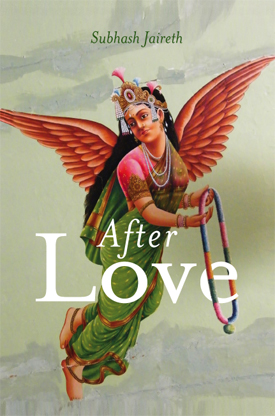Reviews and responses to the book
|
Review of Subhash Jaireth’s After Love 'This is an engrossing novel that does a variety of things at once and takes the reader on a number of different journeys. The primary journey is into the love relationship between the book’s main protagonist, Vasu, a somewhat reticent Indian student of architecture in Moscow—who, among other things, is fascinated by the histories, structures and shapes of different cities—and Anna, a Russian cellist and archaeologist with German ancestry. The novel charts the relationship between these two characters as it develops from first encounters to love and cohabitation. I don’t wish to say too much about the novel’s plot because I don’t want to spoil your own reading experience, but the title of the book will give you a general idea of how things end up between them. Subhash Jaireth does a brave thing in this book. He tells it in the first person voices of the main characters—mostly the voices of Vasu and Anna—and, in doing so, establishes from the start a kind of counterpoint between their respective points of view, and a fugal structure for the novel as a whole. Everyone would know Bach as a major composer of fugues, along with earlier composers such as Pachelbel, and although the fugue eventually gave way to the sonata form, it remained influential—not only in the music of major 18th and 19th century composers such as Mozart and Beethoven, but also in the hands of the great 20th century Russian composer, Dmitri Shostakovich. Perhaps this is one of the Russian connections in the novel (Shostakovich is certainly mentioned in it). In any case, like this novel, fugues often contain an exposition, development and recapitulation and in them two or more voices build on a musical subject that is introduced early and which recurs throughout. In this novel the main themes are unfolded contrapuntally—that is, through the movement of two voices—like two melodic lines—that reference each other in ways which in musical parlance would be called contrary motion, similar motion, parallel motion and oblique motion. So the unfolding of this book’s narrative is one of its fascinations, as the voices of the key characters separate, entwine, run together and diverge. The word ‘fugue’ derives from Latin and is linked to fugere , to flee, and fugare , to chase. Such concepts summarise key aspects of this work, as it documents a love affair where chasing and fleeing are central features. This is not the usual story of early passion and strong embrace that dwindles over time after familiarity has become a habit. Instead it is a story about how two unusual and distinct people come together almost by accident and attempt to negotiate their individuality, cultural differences and relative isolation into a workable partnership. As this negotiation takes place, the reader is taken into both of their families, which are revealed to have very different (and yet not always so different) expectations and dynamics. Some of the most compelling intimations about human intimacy in this work are rendered through these depictions of family life, and in the way families are shown to evolve and change. There is poignancy at the end of the novel as various family stories are brought up to date and are seen to play out, or to have played out, in unexpected ways. Subhash Jaireth is a fine observer of people and sketches their lives with subtlety and nuance—in ways that are almost understated at times but always persuasive. By the end of the novel I thought that many of these characters could have been people I had met in the flesh. This novel also takes us to different cities in various countries—Moscow, Sydney and Venice, among others. It is a novel about how people in our time move around and make connections that cross international and cultural boundaries; about the fluidity of relationships and the mobility of love. It is about how some older traditions can no longer capture or contain the intimate relationships that people have, and how different expectations between lovers—always tricky to some extent, even when people share similar backgrounds—are difficult to negotiate across cultural boundaries and international borders. In addition, this book is a celebration of culture. It includes small dissertations about cities and their planning, music, art, and other subjects—all of them unfailingly interesting and all of them tied closely to the depiction of one or other of the characters. It fascinated me how much in this book functions both literally and symbolically—how connections or failures of connection between various characters were articulated through their musical or cultural activities. And the theme of archaeology, subtly laced throughout this work and most overtly addressed through Anna's studies in the subject, emphasises this novel's preoccupation with knowing and finding the past and with scrutinising memory. Some of this scrutiny focuses on family history and on the often untold stories that are implicit in many photographs. As the novel explores these issues, the reader is shown the limitations and frustrations of such activity as well as some of its intriguing satisfactions. So the title, After Love , is not simply about the characters Anna and Vasu; it is also about what happens after love and close human connection more generally, in all sorts of circumstances. It explores how one character, Vasu, learns about himself through his experience of love, not so much allowing him to change—although that is part of the story—but allowing him to understand the world and his place in it. At times this novel emphasises reflection and contemplation as much as action—although plenty does happen in the book—and that, too, is one of its pleasures. You will find a fascinating series of journeys in this novel. I thoroughly recommend it to you for the fineness of its perceptions, and for its artful, often beguiling writing and construction—in short, for the various and varied riches you’ll find within its pages.' |

